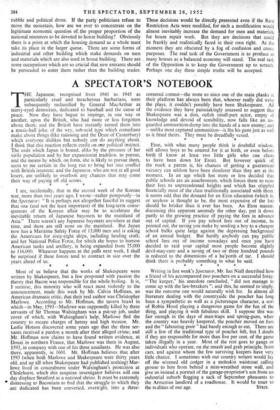Writing in fast week's Spectator, Mr. Ian Niall described how
a friend of his accompanied two poachers on a successful foray. " The keeper," his anecdote concluded, " did not manage to come up with the law-breakers "; and this, he seemed to imply, was the outcome one would naturally wish for. In almost all literature dealing with the countryside the poacher has long been a sympathetic as well as a picturesque character, a sort of Robin Hood playing a dangerous game for the fun of the thing, and playing it with fabulous skill. I suppose this was fair enough in the days of man-traps and spring-guns, when the country was heavily keepered, the poacher moved on foot and the " labouring poor " had barely enough to eat. There are still a few of the traditional type of poacher left, but I doubt if they are responsible for more than five per cent. of the game taken illegally in a year. Most of the rest goes to gangs or individuals who operate, on the smash"and grab principle, from cars, and against whom the few surviving keepers have very - little chance. I sometimes wish our country writers would lay off the wizened old codger in a moleskin waistcoat calling grouse• to him from behind a mist-wreathed stone wall, and give us instead a portrait of the garage-proprietor's son from .an industrial suburb flogging a sack of September pheasants to the Armenian landlord of a roadhouse. It would be truer to


































 Previous page
Previous page